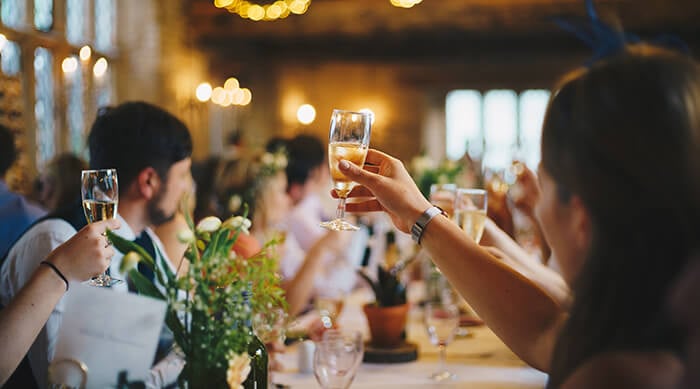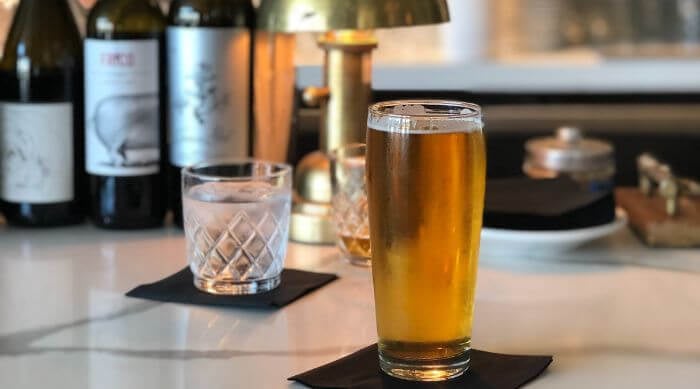Catching a happy hour or winding down after work with a glass of wine isn’t uncommon. For most, there is nothing risky with having an occasional drink… but when we stop being mindful about our alcohol consumption, problems tend to arise.
For many, thinking more seriously about drinking is a byproduct of the sober curious movement as people look beyond Dry January for ways to reevaluate their drinking habits and alcohol use. Others practice mindful drinking as a way to moderate drinking and alcohol intake that has left them feeling less like themselves.
How does mindful drinking help? Mindful drinking helps reshape unhealthy drinking habits into conscious, balanced choices for better well-being.
When we are intentional about our drinking habits and honest with our relationship with alcohol, it’s less likely to be a crutch for escaping emotions and stress.
Table of Contents
What is Mindful Drinking?
Mindful drinking is when someone is not only aware of how much they’re drinking but aware of why they’re drinking. It’s not total abstinence (unless that’s how you feel mindful drinking works best for you).
These habits are more like moderation management done in a way that addresses the reasons behind you’re drinking and whether or not that cocktail is necessary at that moment. In simple terms, you’re thinking before you start drinking.
The mindful drinking movement has gained traction in recent years. Laura Willoughby, a co-founder of Club Soda, pivoted away from being a heavy drinker and wanted to inspire people to reflect on their choice and connection with alcohol.
What started as a Facebook group has now grown into a social impact business providing resources, courses, events, and workshops for people who want to mindfully drink.
How do you become a mindful drinker? You become a mindful drinker by asking yourself why you’re drinking.
In our culture, drinking can be expected in social situations. For example, a champagne toast is a cultural norm in major celebrations, but it can lead to mindless binge drinking as the evening progresses.
Mindful drinking thinks about the next drink, just like you wouldn’t eat a whole birthday cake to celebrate a birthday, consider whether it’s worth that extra drink or two.
Benefits of Mindful Drinking
Mindful drinkers don’t always live the teetotal lifestyle, but they are aware of the effects of alcohol on the body. They cultivate a healthier relationship with alcohol by cutting down on the amount of alcohol they consume.
In turn, they experience a number of mental and physical health benefits.
What are the benefits of mindful drinking? The benefits of mindful drinking include an overall improved well-being, better sleep, and even reduced risk of chronic disease.
1. Better Sleep
It may seem like you’re prone to a deep, heavy sleep after a night out, but drinking and sleep don’t mix long-term.
Alcohol may help you fall asleep faster, but in the process, it is damaging your sleep cycles.
Drinking delays and even prevents REM sleep. That’s the sleep stage where most dreams happen. Missing too much REM sleep affects cognition, contributing to that terrible fog the next day after too much drinking.
2. Mental Health Improvements
A bad hangover the next day isn’t the only drawback of drinking too much the night before. Drinking too much is not the healthiest choice, and we’re not just talking about the empty calories.
Overindulgence in alcohol can exacerbate mental health conditions like anxiety and depression.
How does alcohol affect the brain? Alcohol affects the brain over time with long-term effects on memory loss, cognitive decline, and depressive symptoms.
Immediate effects on the brain from alcohol consumption include slowing your reaction times, impairing your judgment, and making it difficult to control motor functions.
3. Healthy Weight Management
We tend to forget (or blissfully ignore) the calories when drinking socially. The average glass of wine has about 125 calories, and alcoholic beverages can range from 100 calories in the average light beer to 570 calories in a white Russian.
Reevaluating the after-work cocktail can spark healthy weight loss just by cutting some empty calories.
4. Lower Blood Pressure
While consuming alcohol slows down certain body functions initially, binge drinking and alcohol abuse has been linked to high blood pressure and increased risk of heart disease in the long run.
Cutting back on alcoholic beverages can reduce your blood pressure in under a month’s time.
5. Clearer Skin
Be kind to the skin you’re in! Excessive alcohol use has inflammatory properties that can alter the function of blood vessels in your skin. Not only can it cause more wrinkles, but your skin can get dry and puffy.
In just one week of mindful drinking, you can see that glow come back to your face. Swapping out your glass of wine for a glass of water helps to rehydrate and regenerate even faster!
6. Liver Function
We all know that alcohol can cause liver disease. Fat accumulates in the liver as it processes large amounts of alcohol. Even just a few days of overconsumption can lead to fat build-up.
There are rarely any symptoms of alcoholic fatty liver disease, but it can lead to more serious problems, like alcoholic hepatitis and cirrhosis.
Thinking about each drink you have and when you have them can give your liver the time it needs to filter the beverages you do decide to have.
How to Practice Mindful Drinking
Waking up one morning and proclaiming that you’re never drinking again because you’re tired and feeling hungover may sound like a solid plan, but mindful drinking takes work. To be intentional about your decision, we have a few tips to make your lifestyle change.
Keep in mind that mindful drinking isn’t a replacement for an alcoholism program. If you struggle with alcohol addiction, feel like you need to drink to get through the day, or can’t stop yourself from drinking, seek help from a professional.
For those on the path to becoming more mindful about their drinking, you may already be using some successful strategies. If you’re considering trying a dry month, we've got tips on how to be mindful when you’re drinking.
Reflect on why you’re drinking
It’s important to ask yourself tough questions if you’re embarking on the journey of mindful drinking. Most importantly, ask yourself: “Why are you drinking?”
Is it because you have a hard time drinking less alcohol around certain people? Is it certain situations, like a happy hour, that are the problem?
Are you bored? Are you using alcohol to keep up with your social circle?
Pay attention to how your answers make you feel. The point here is to think about your drinking in a way you may not have before. If drinking has become reflexive for you, think about why. If you’re into meditation, introduce this way of thinking into your practice.
Once you understand why you’re drinking, it’s easier to cut back and anticipate situations where drinking may become a problem.
Have a plan
It’s hard to decide that you’re just going to drink less when you don’t really know what that means. Be specific with what you’d like to do with your habits, and adjust as needed based on your goals and needs.
When your goal is to drink fewer drinks, think about how that looks for you and your daily life. Some adopt a “Rule of 3” approach.
What is the rule of 3 for mindful drinking? The “Rule of 3” means drinking only 3 days per week.
If you want to see how you feel with a month off of drinking, your goal may be a Sober September, Sober October, Dry January, or whatever month you choose to abstain from alcohol. A longer period of abstaining from alcohol may feel great or even easier than you thought.
You may find that you’d rather join the sober celebrities out there and transition to stop drinking altogether.
Find your favorite non-alcoholic drinks
There’s a plethora of options out there when it comes to alcohol-free drinks. You don’t need to swap that bottle of wine for grape juice just yet.
Creative mocktails and wine alternatives without the alcohol are easy swaps when you’re looking to cut back on drinking. The market for non-alcoholic beer grows almost 4% each year as millennials and the younger generation are changing their views on alcohol.
You can still get your friends together for wine night and have no worries with a bottle of our non-alcoholic rosé.
Adjust your order
Mindful drinking isn’t necessarily about wholly cutting drinking out of your life, but finding the best time to drink. It’s about being more intentional about the act.
Sip slowly when you do drink. It’s a good rule of thumb in general, by the way, especially if you’re a woman worried about blood alcohol levels. Women, unfortunately, get intoxicated faster.
You can also ask your bartender to do half-pours instead of full shots of alcohol, or top your wine with a spritz of seltzer for a refreshing lower-alcohol option.
When you do drink, turn that drink into an experience.
Appreciate what it is that brought you to that drink in the first place. Maybe it’s seeing your friends for the first time since a pandemic started or a glass of bubbly to celebrate a big win. Savor the drink, but savor the moment more.
Find Alcohol-Free Activities
If you find that most of what you’re interested in both personally and socially involves drinking, it may be time to find healthier alternatives to drinking.
If you drink because you find yourself bored, find new ways to beat that boredom. That can be getting into 15-minute yoga or texting your funniest friend. Take the dog out for a walk or read that book that’s been collecting dust on your shelf.
Connect with friends open to the changes you’re making to your lifestyle. Friends should be supportive of healthy habits.
Track your habits
Mindful drinking may not come naturally to you at first.
To build intentional habits, you may want to physically write down what you’re drinking and how often you’re drinking until you see those patterns in a more obvious way.
That can be in the form of an app on your phone or diary, like you might do with a new diet or mindfulness program.
Once you feel like you’re in the groove, check in with yourself from time to time. Give yourself a mini progress report on how you’re doing with any goals you’ve set for yourself. Keep yourself accountable.
Embrace Mindful Drinking with Dry Alternatives
Are you ready to embrace mindful drinking? Consider your relationship with alcohol and your sober curiosity. There are plenty of reasons good and bad to explore your alcohol use.
You can still enjoy a social life, a night out, and a champagne toast on a special occasion. Try a non-alcoholic sparkling white or our canned Brut for easy portability.
Surely tastes like the real thing, and our alcohol-removed wines are a natural choice when you’re on your mindful drinking journey.





![What is Sober October? [Tips For Success + Recipes]](https://dropinblog.net/34240221/files/featured/Sober_October.jpg)
